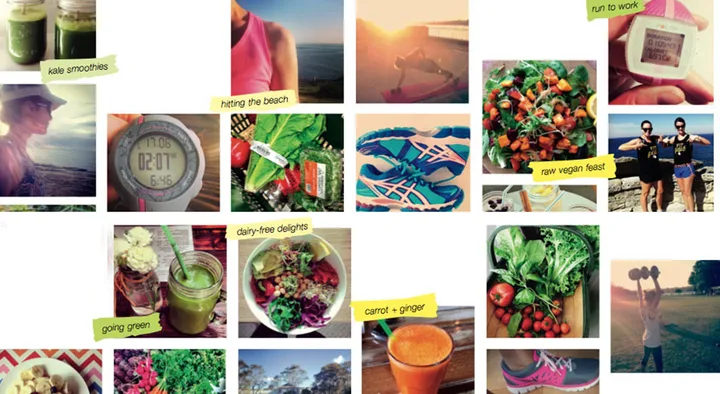“Great achievement is usually born of great sacrifice.” At least, it is according toInstagram where, in one week alone, I saw this quote plastered across a sunlit field of barley, a picturesque lake surrounded by autumnal trees and, inexplicably, a baby crawling across a mat as men in feudal-era Japanese robes looked on encouragingly. The quote, originally uttered by US writer and the grandfather of self-help, Napoleon Hill, seems like sound advice: you can’t lose weight without ditching the doughnuts, or get a degree without weekend study.
But lately, sacrifice and self-control seem to have become not a means to an end,but an end in itself. Barely a week goes by without a friend (or two, or three) embarking on a detox, an acquaintance admitting they’ve given up alcohol for a few months, or a relative proudly announcing how much more productive they are now they’ve finally given their TV away.
This new mania for sacrifice and self-control is difficult to avoid. Log on to Facebook and you’ll find the stream of party pics has been replaced by gym selfies, “fitspo” images and “mapped runs”. Tune into reality TV and, as the UK Guardian recently pointed out, the bed-hopping Big Brother contestants have been superseded by The X Factor and My Kitchen Rules, programs that preach hard work over debauchery.
Even our idols have grown ascetic. The models who sipped, smoked and snorted their way through previous decades with furious excess have been replaced by sun-saluting yoga goddesses who are more likely to credit their success to hard work, a gruelling fitness regimen and meditation than a fast metabolism or forgetting to eat.
Of course, Gwyneth Paltrow is the celebrity most conspicuously flying the flag for an aggressively wholesome lifestyle, but even us regular folk have started spending our weekends at farmers’ markets instead of the pub, are increasingly partial to a green juice and know we should be eating more kale (even if we aren’t entirely sure what to do with it).
In the office, too, the narrative has changed. These days, the concept of “work-life balance” seems positively outdated. Sheryl Sandberg, COO of Facebook and an outspoken advocate for women leaders, is urging us to “lean in” at work, famously telling an interviewer that “there’s work, and there’s life, and there’s no balance”.
If the ’80s were all about greed and the ’90s rebelled with slacker swagger, then the present is all about self-control. Welcome to the new age of discipline, where the early bird gets the worm, we make our own luck, and having it all means giving everything up.
So, why is everyone suddenly aspiring to a disciplined way of life? “We want certainty in a world that is inundated with choice,” says Rebecca Huntley, director of research at Ipsos Mackay. “It’s about feeling in control in the face of multiple options.”
When you consider that we each receive up to 300 emails a day, are exposed to 250 to 3000 advertisements within 24 hours – each selling a different product, body or lifestyle – and consume four times as much information as we did 30 years ago, is it any wonder that laser-focus and an ability to shut out noise is prized above all else? “In the chaos of the liberal free market,” writes author and philosopher Alain de Botton, “we lack guidance, self-understanding, self-control, direction”. In other words, we crave what we don’t have.
Of course, there are less esoteric forces behind this new-found austerity. Put simply, we like our jobs – and in uncertain economic times, we’re scared of losing them. “Despite the way we portray Gen Y in wider culture, many young people are very ambitious,” observes Huntley. “In a world that’s increasingly competitive, they may feel that they need to have a rigid, punishing schedule that relates to both their body and professional life [in order to succeed].”
Martin Hagger, professor of psychology at Curtin University, agrees: “The economic times are such that people feel they must commit more time to work – or they’ll be replaced by someone who will. ”
Australians have one of the longest working weeks of any developed country – and late nights, junk food and large amounts of alcohol are not conducive to 12-hour workdays. Add the death of long, boozy work lunches due to post-GFC cost cutting (deals are now done over Skype and preceded by a vigorous lunchtime workout) and there just isn’t much room for indulgence.
Even so, this only partly explains the explosion of alcohol abstinence movements like Dry July and Hello Sunday Morning – or, if you live in an affluent suburb, the ubiquity of Lululemon yoga pants as everyday attire. Partially, at least,we’re choosing discipline because it makes us feel good. Studies show that disciplined people are happier in the moment and in the long run. But somewhere along the way, these things also became…cool.
The more gruelling the regimen, the greater the glory. Instead of regular exercise, we joined boot camps. Instead of a balanced diet, we chose juice cleanses. Even yoga, an exercise that dedicates a large part of its practice to the automated human response of breathing, has been turbocharged with hot rooms and “power” sessions.
Professor Hagger believes the rise of celebrity culture may be responsible. “The positive way we view discipline is partly to do with the number of high-profile athletes and celebrities who advocate that kind of lifestyle,” he says.
Which leads us back to Gwyneth Paltrow. In the past five years, the Oscar-winning actress-turned-lifestyle-guru has become far more famous for eliminating nightshade vegetables than she ever was for her film roles. Not only does she share the full, punishing extent of her diet and exercise routine, she wears it as a badge of honour. The 41 year old’s inspiring transformation of a perfectly fine, stock-standard Hollywood bum into “the butt of a 22-year-old stripper” (her words) became the fairytale rear-ending for our times.
In the past, remarks Professor Hagger, most of us would have simply viewed Paltrow and her ilk as “genetic freaks”. But thanks to the media’s unprecedented access to the minutiae of celebrities’ lives, that’s changed. “Nowadays we look at them and think, I could be like you – with the right exercise, diet and lifestyle,” he says.
It’s a belief celebrities themselves are eager to encourage. “Celebrities realise there’s a real market of people out there who want to know what they eat, what clothes they like, who their favourite bands are,” Dana Randall of FORM MGMT, a New York branding agency, told The New York Times. “And, of course, they are wonderful business opportunities.”
Paltrow can’t sell us her mother, Blythe Danner’s, ageless genes, a fast metabolism or a Protestant work ethic on GOOP, her hugely popular website and newsletter. She can spruik the recipe for her sugar-free cupcakes, a prescription for rock-hard glutes and a Breton-striped tee for our kids. (Did I mention the kids? They’re disciplined. They only watch cartoons in foreign languages and Paltrow would “rather die than see [them] eat a Cup a Soup”.)
Add to this the growing trend towards self-improvement, which encourages us to see ourselves as work-in-progress products to be constantly upgraded, and it’s not hard to understand why many of us feel the need for a highly disciplined lifestyle. Of course, it comes easier to some than others – genes, upbringing and our personal relationships all have an influence, according to Professor Hagger.
But even if DNA and environment have conspired to place you on the slovenly, Cup a Soup end of the spectrum, there is hope. Some experts believe discipline is like a muscle: the more you use it, the stronger it gets. (On the other hand, others liken it to a tank that gets depleted or reduced when you have to resist temptation.)
There’s also a fine line between discipline and deprivation – and the latter can easily slide into exhaustion. US therapist Andrea Wachter writes that you’re veering into dangerous territory “when taking a day off from exercise feels terrifying or unacceptable”, or “when the list of what feels safe to eat becomes smaller than the list of what is off limits”.
Even the Goop goddess herself confesses, “Some days I feel like everyone in my world has plugged themselves into my kidneys, I’m so tired.” We may be one gushing profile away from the revelation that Gwyneth’s neighbourhood of Westwood is, in fact, powered entirely by the glow of good health emanating from her renal organs, but if a Hollywood movie star is fatigued, what hope do the rest of us have?
I should confess that my own alcohol-free month lasted just four days and, until recently, the closest I’d come to green juice was when cleaning out the vegetable crisper after a long holiday. So, where does the restraint revolution leave those of us who have never lifted anything heavier than a glass of wine and believe quinoa to be a martial art?
Just as the puritanical, sexually repressed Victorian era finally gave way to the Roaring Twenties, there will come a time when the idle inherit the earth. It’s just a matter of laying low and waiting it out. And I expect we’re quite good at that.










